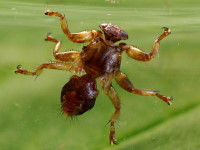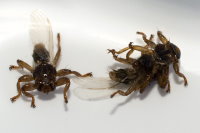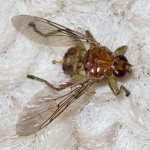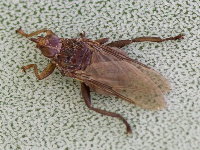Hippoboscidae (4)
Lausfliegen Louse flies, keds
The family Hippoboscidae (louse flies or keds) is a member of the superfamily Hippoboscoidea.
The louse flies are small, flat-built, blood-sucking ectoparasites of mammals and birds. There are unwinged species, such as the sheep fly (Melophagus ovinus) and winged species, such as the louse fly (Hippobosca equina). Some species, e.g. the deer ked (Lipoptena cervi), throw off their wings when they have found a suitable host.
All species of the Hippoboscidae family are vivipar. After hatching, the larva remains in the mother's body and feeds on secretions. It grows and sheds itself twice inside the mother. At birth, the larva is full-grown and ready to pupate immediately.
The louse flies are small, flat-built, blood-sucking ectoparasites of mammals and birds. There are unwinged species, such as the sheep fly (Melophagus ovinus) and winged species, such as the louse fly (Hippobosca equina). Some species, e.g. the deer ked (Lipoptena cervi), throw off their wings when they have found a suitable host.
All species of the Hippoboscidae family are vivipar. After hatching, the larva remains in the mother's body and feeds on secretions. It grows and sheds itself twice inside the mother. At birth, the larva is full-grown and ready to pupate immediately.



